A trio of Trump-era Justice Department officials testified Thursday before the House Select Committee investigating the Jan. 6 insurrection about the former president’s efforts to exert pressure on the department in his bid to overturn the 2020 presidential election.
The panel detailed former President Donald Trump’s efforts to leverage the Department of Justice to help keep him in power, from directing officials to investigate baseless claims of voter fraud and a stolen election to a dramatic Oval Office meeting in which the commander-in-chief openly mused replacing the head of the DOJ with a lower-level official who supported his allegations of a stolen election.
“For the department to insert itself into the political process this way, I think would have had grave consequences for the country that very well may have spiraled us into a constitutional crisis,” former deputy acting attorney general Richard Donoghue said Thursday.
“Donald Trump didn't just want the Justice Department to investigate,” chairman Bennie Thompson, D-Miss., said. “He wanted the Justice Department to help legitimize his lies to basically call the election corrupt to appoint a special counsel to investigate alleged election fraud to send a letter to six state legislatures urging them to consider altering the election results.”
“And when these and other efforts fail, Donald Trump sought to replace [Jeffrey] Rosen, the acting Attorney General, with a lawyer who he believe would inappropriately put the full weight of the Justice Department behind the effort to overturn the election,” Thompson continued.
The former president, Rep. Adam Kinzinger charged, “was willing to sacrifice our republic to prolong his presidency.”
“I can imagine a no more dishonorable act by a president,” Kinzinger, one of just two Republicans on the House Jan. 6 panel, added.
Here are takeaways from the House Jan. 6 panel’s fifth public hearing:
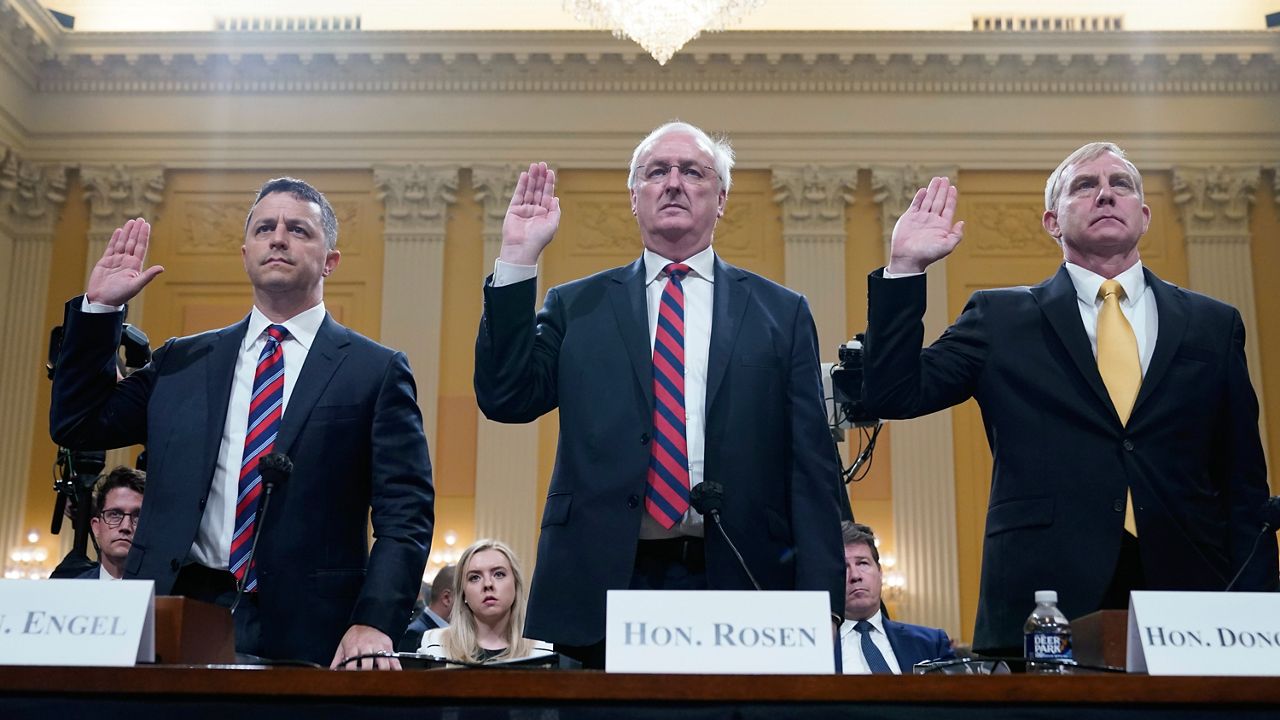
Richard Donoghue, the former acting deputy attorney general who served in the waning months of the Trump administration, on Thursday described his repeated attempts to explain to Donald Trump that the Department of Justice did not have the authority to interfere in state-run elections – to little avail.
Donoghue recalled a 90-minute phone call with the president on Dec. 27, 2020, where Trump “had this arsenal of allegations that he wanted to rely on” to attempt to delegitimize the results of elections in certain states.
But, Donoghue repeatedly said on Thursday, the Department of Justice found no evidence of widespread fraud that “came close to calling into question the outcome of the election in any individual states.”
“I felt in that conversation that it was incumbent on me to make it very clear to the president what our investigations had revealed, and that we had concluded based on actual investigations, actual witness interviews, actual reviews of documents, that these allegations simply had no merit,” Donoghue told the House committee investigating the Jan. 6 insurrection.
Both Donoghue and the acting attorney general “tried to explain to the president on this occasion and on several other occasions that the Justice Department has a very important, very specific but very limited role in these elections.”
“States run their elections. We are not quality control for the states,” Donoghue added.
Throughout December and into January, the president remained adamant “that we were not doing our job,” Donoghue told the committee, and persisted with his claims of election fraud despite being told numerous times he was wrong.
“It did escalate over time until ultimately the meeting on January 3, which was the most extreme of the meetings and conversations,” Donoghue said, adding at one point, the president told him: “‘Just say the election was corrupt. And leave the rest to me and the Republican congressmen.’”
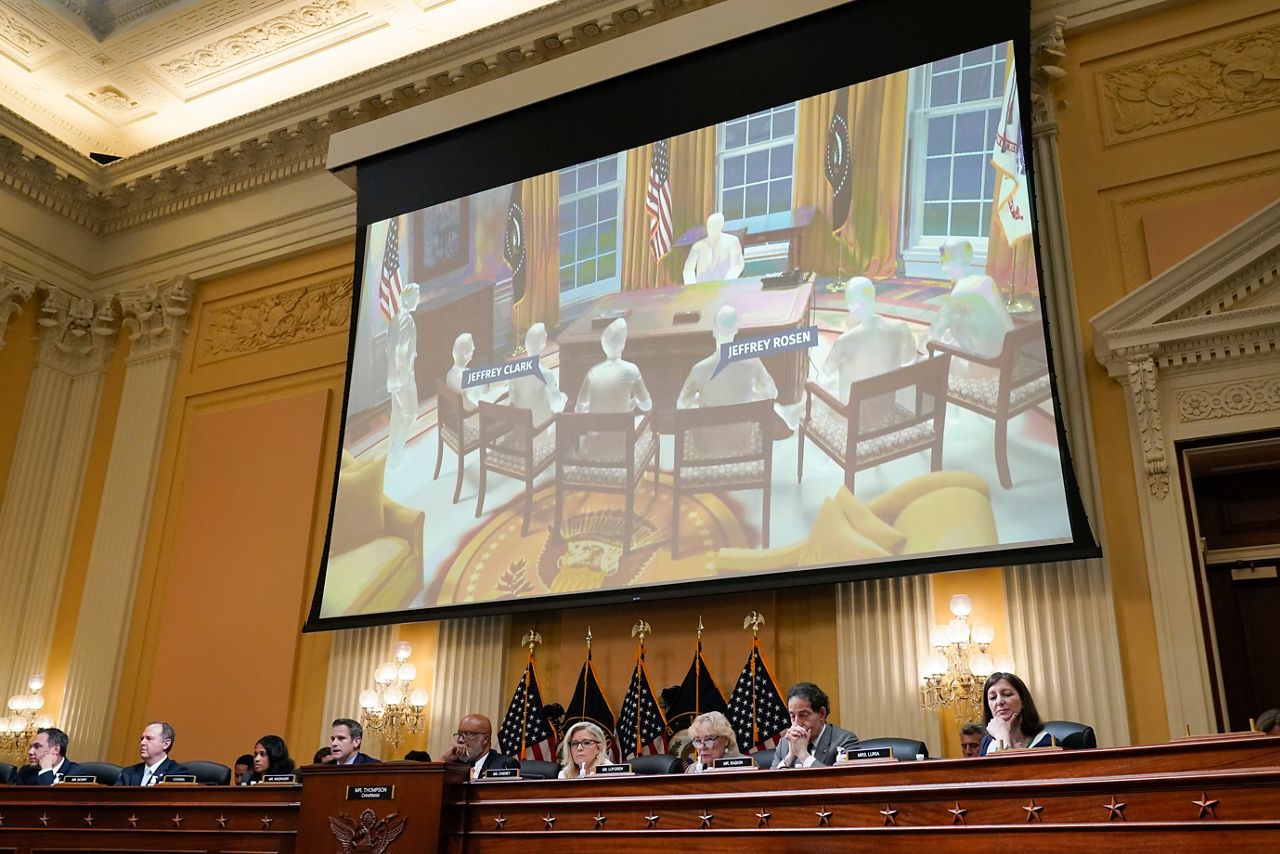
Much of Thursday's hearing centered around Jeffrey Clark, a lower-level Justice Department official who embraced former President Donald Trump's baseless claims of election fraud.
In videotaped deposition played at Thursday's hearing, former acting deputy attorney general Richard Donoghue and former White House lawyer Eric Herschmann recounted the events of an Oval Office meeting in Jan. 2021 during which former President Donald Trump discussed replacing acting attorney general Jeffrey Rosen with Clark.
"I made the point that Jeff Clark is not even competent to serve as the attorney general. He’s never been a criminal attorney," Donoghue said. "He’s never conducted a criminal investigation in his life. He’s never been in front of a grand jury, much less a trial jury."
"You’re an environmental lawyer," Donoghue recalled he said to Clark. "How about you go back to your office, and we’ll call you when there’s an oil spill."
Clark's plan centered around a letter drafted by Clark that could have paved the way for Georgia and other states to swap out their Democratic electors with slates of Donald Trump-friendly electors, despite that Biden won the states.
The 2020 letter claimed the Justice Department investigations “identified significant concerns that may have impacted the outcome of the election in multiple states, including the state of Georgia.”
The former White House lawyer said that Clark was "clobbered over the head" during the meeting and noted that he thought the official's plan was "nuts."
"I thought Clark's proposal was nuts," Herschmann said. "I mean, here’s a guy that, at a certain point, you know, listen, the best I can tell is the only thing you know about environmental and election challenges is they both start with 'E.' And based on your answers tonight, I’m not even certain you know that."
Donoghue recalled that former White House counsel Pat Cipollone described the letter as "a murder-suicide pact."
"It's going to damage everyone who touches it. And we should have nothing to do with that letter," Donoghue, who testified in-person on Thursday, recalled for the committee in recorded testimony. "I don't ever want to see that letter again.”
"When he finished discussing what he planned on doing, I said, good f****** – excuse me, sorry, effing – a-h***, congratulations, you just admitted your first step or act you would take as attorney general would be committing a felony and violating Rule 6(e) [federal grand jury secrecy rules]," Herschmann said. "You’re clearly the right candidate for this job."
Herschmann told the panel that the plan to replace Rosen with Clark "was asinine."
On Wednesday, ahead of the House Jan. 6 panel's Thursday hearing, federal agents conducted a search of Clark's home in Virginia, sources told The Associated Press. The reason for the search was not clear.
)
While Trump appeared to still be strongly entertaining the idea of installing Jeffrey Clark as acting attorney general, Justice Department leaders met with President Donald Trump and some of his advisers at the White House on Jan. 3, 2021 – just days before the violent insurrection at the U.S. Capitol.
That meeting, witnesses testified Thursday, was initially focused on a letter drafted by Clark sent around to top Justice Department officials in late December, asking them to co-sign the document that would be sent to Georgia lawmakers saying the department had “identified significant concerns” with Georgia’s election, without sufficient evidence.
The acting attorney general Jeff Rosen repeatedly refused to sign the letter, and the Jan. 3 meeting soon turned to Trump’s desire to replace Rosen with Clark, the latter of whom had no criminal litigation experience.
In that meeting, Trump told then-Acting Attorney General Jeffrey Rosen that it was clear he wasn’t “going to do anything” because he didn’t believe his election fraud claims and that Clark “might do something,” according to Rosen.
“After some preliminaries, the president turned to me and he said: ‘Well, one thing we know is you, Rosen, you aren't going to do anything. You don't even agree with the claims of election fraud. And this other guy, at least might do something,’” Rosen recalled of the meeting.
Rosen said he told the president he was right he wouldn’t try to overturn the election because “that’s what’s consistent with the facts and the law.”
"And then I said: ‘Well, Mr. President, you're right, that I'm not going to allow the Justice Department to do anything to try to overturn the election,'" Rosen testified. "That's true.”
Later in the meeting, acting Deputy Attorney General Richard Donoghue threatened to immediately resign if Trump promoted Clark and said many others would follow, Donoghue testified.
Donoghue said he told Trump: “Every single AAG (assistant attorney general) will walk out on you. Your entire department leadership will walk out within hours. And I don’t know what happens after that. I don’t know want the United States attorneys are going to do.”
“My guess would be that many of them would have resigned, and that would then have led to resignations across the department in Washington,” Donoghue continued.
“I said, Mr. President, within 24, 48, 72 hours, you could have hundreds and hundreds of resignations … because of your actions. What's that going to say about you?” he added.
Steven Engel, former assistant attorney general for the Office of Legal Counsel, testified that Trump asked him if he, too, would resign. Engel said he told Trump, “I couldn’t be part of this.”
Donoghue also said he told Trump that Clark wasn’t qualified or competent enough to run the Justice Department. Donoghue added that no one in the meeting spoke in support of Clark.
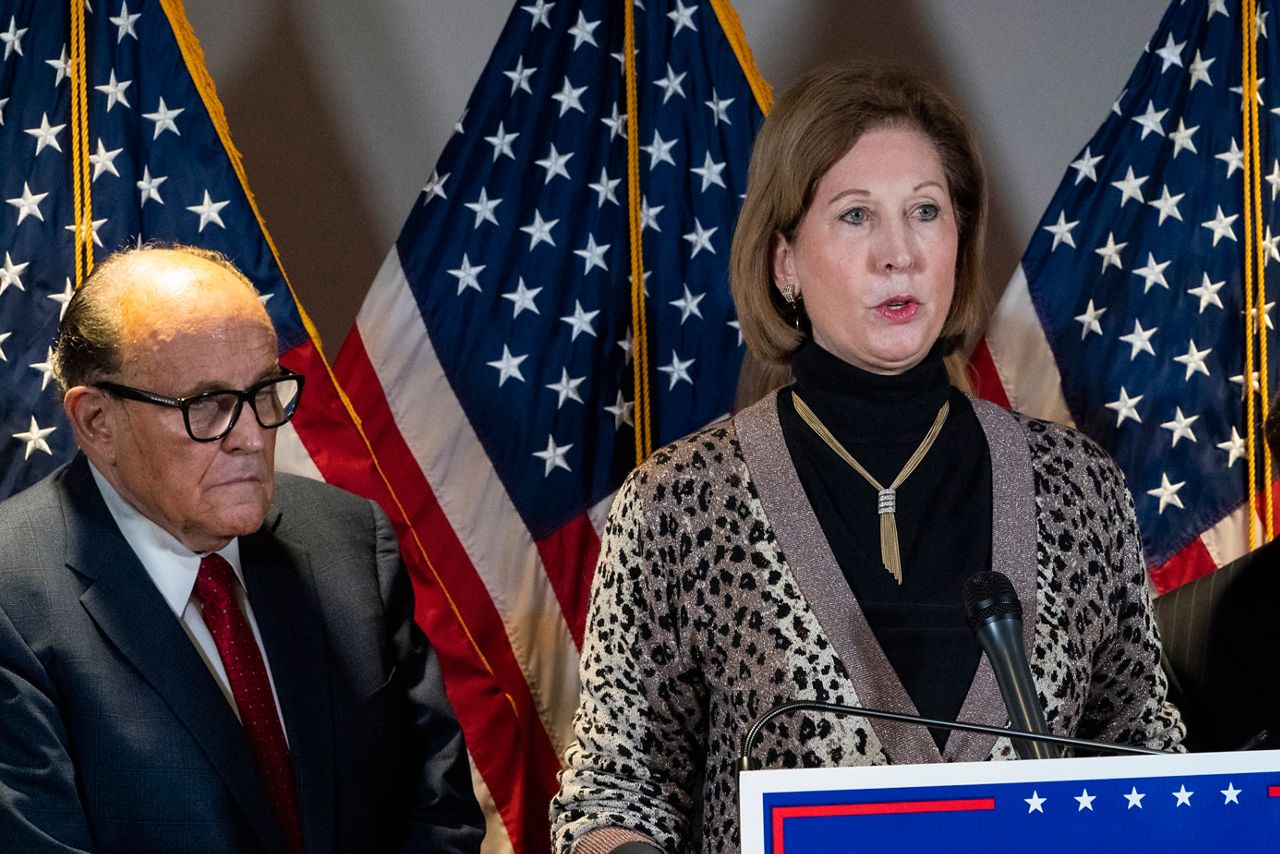
Thursday’s witnesses have testified that Donald Trump hoped the Justice Department would name a special counsel to investigate election fraud claims.
At one point, the president apparently even offered the job to conservative attorney Sidney Powell, whom Trump once touted as part of his campaign’s “great team” of lawyers trying to prove the election was stolen from him. A former federal prosecutor, Powell is perhaps best known for promoting wild election fraud claims, including that voting software used in the U.S. was created in Venezuela at the direction of Hugo Chavez and designed to flip votes for Trump to Joe Biden.
Powell told the Jan. 6 committee, in video showed at Thursday’s hearing, that on Dec. 17, 2020, Trump “asked me to be special counsel to address the election issues and to collect evidence, and he was extremely frustrated with the lack of — I would call it law enforcement by any of the government agencies that are supposed to act to protect the rule of law in our republic.”
Only the attorney general can appoint a special counsel, which typically happens when the DOJ believes it has a conflict of interest in an investigation
Trump already had Justice Department officials about the possibility of naming a special counsel but was turned down.
At a news conference before he resigned in December 2020, Attorney General Bill Barr said he believed the investigation was “being handled sensibly and professionally” and that he did “not seen a reason to appoint a special counsel.”
Acting Attorney General Jeffrey Rosen, Barr’s successor, also did not believe a special counsel was warranted, former assistant Attorney General for the Office of Legal Counsel Steven Engel testified Thursday.
Committee member Rep. Adam Kinzinger, R-Ill., suggested appointing a special counsel so soon before the Jan. 6 election certification would not have been about getting to the truth.
“It wasn't to investigate anything,” he said. “An investigation led by a special counsel would just create an illusion of legitimacy and provide fake cover for those who would want to object, including those who stormed the Capitol on Jan. 6.”
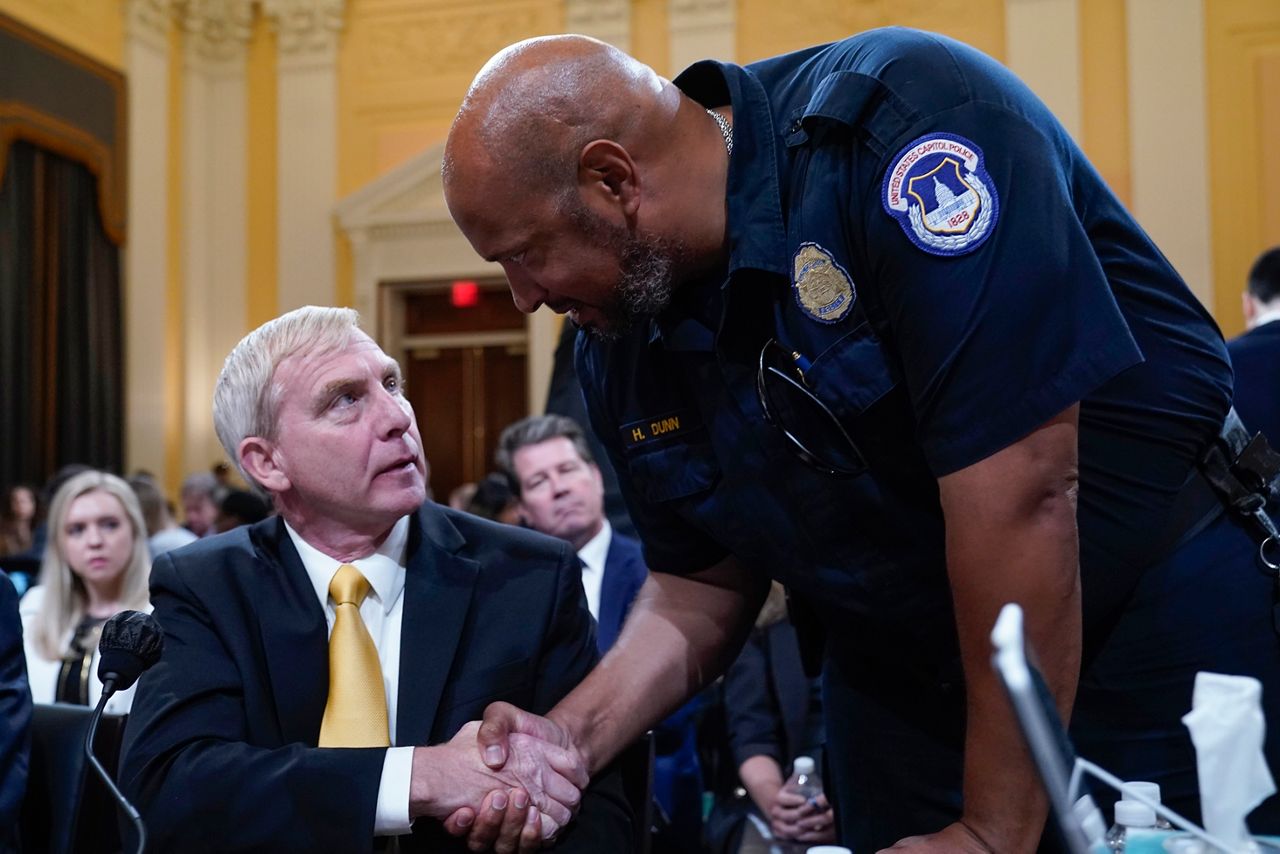
The House Select Committee on Thursday said Thursday that they confirmed that former President Donald Trump's then-defense secretary Christopher Miller, at direction of White House Chief of Staff Mark Meadows, to probe a bogus election fraud claim that an Italian satellite had switched votes from Donald Trump to Joe Biden.
Illinois Rep. Adam Kinzinger said Thursday that the panel learned that Miller called the attaché in Italy to investigate the baseless theory, which he said moved from "recesses of the internet" into the hands of the president.
Former deputy attorney general Richard Donoghue called the baseless claim "pure insanity."
Former acting attorney general Jeffrey Rosen testified that he told Meadows that "this whole thing about Italy had been debunked" and he refused to meet with the person in the video.
Meadows asked Rosen why he wouldn't meet with the person in the video, to which he replied that "if he has real evidence, which this video, you can walk into an FBI field office anywhere in the United States, there's 55 of them."
“The ask for him was, can you call out to defense attaché Rome and find out what the heck is going on?" Miller told the panel. "Because I’m getting all these weird crazy reports and probably the guy on the ground knows more than anything."
"This is one of the best examples of the lengths President Trump would go to stay in power," Kinzinger said said. "Scouring the internet to support his conspiracy theories."
According to Donoghue's handwritten notes, Trump said, "You guys may not be following the internet the way I do."
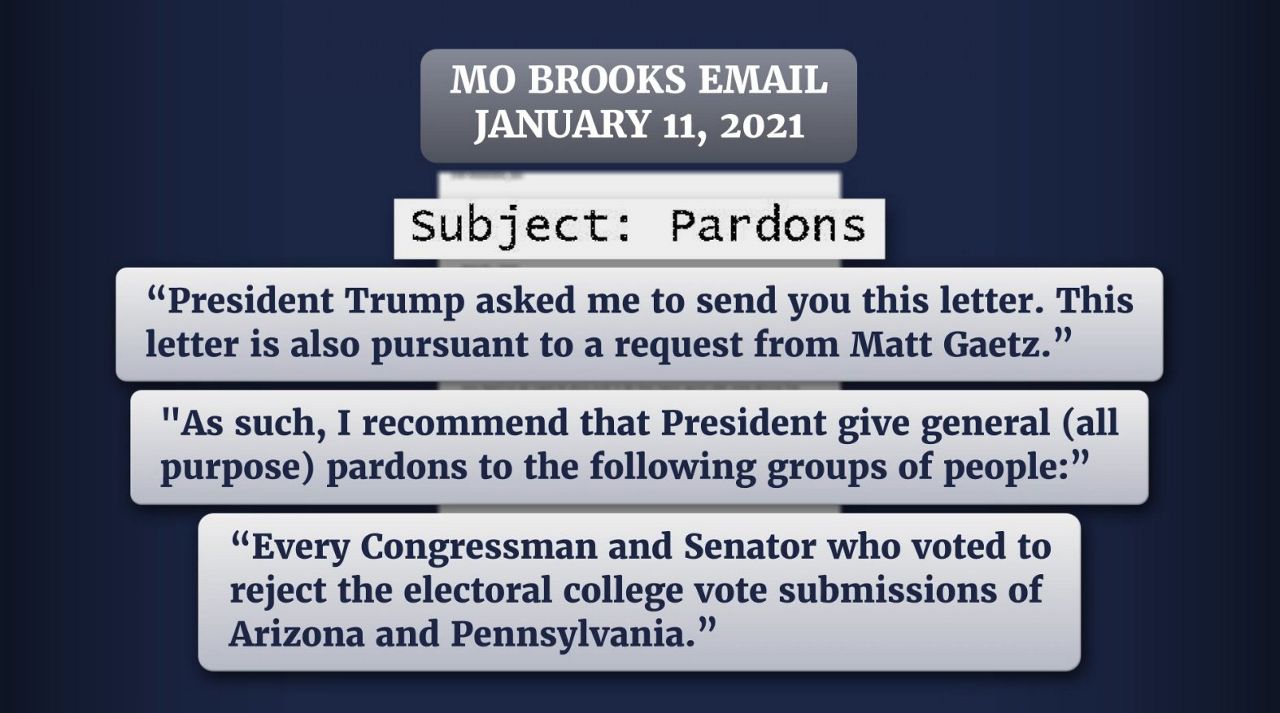
A handful of Republican members of Congress asked President Donald Trump for a pardon before he left office, the House committee investigating the Jan. 6 insurrection on Capitol Hill revealed Thursday.
Those Republicans who requested preemptive pardons from the president included Reps. Matt Gaetz of Florida, Mo Brooks of Alabama, Andy Biggs of Arizona, Louie Gohmert of Texas and Scott Perry of Pennsylvania.
Rep. Jim Jordan of Ohio asked whether Trump planned to pardon members of Congress, but did not ask to be pardoned himself, the panel said.
“My colleagues and I up here also take an oath. Some of them failed to uphold theirs, and instead chose to spread the big lie,” Rep. Adam Kinzinger, R-Ill., one of two Republicans on the committee, said Thursday. “Days after the tragic events of January 6, some of these same Republican members requested pardons in the waning days of the Trump administration.”
The committee showed images of a request from Brooks to the White House “pursuant to a request from Matt Gaetz, requesting a pardon for Representative Gaetz himself and unnamed others.”
When asked if he believed Gaetz was seeking a pardon for himself, former Trump White House lawyer Eric Herschmann said in recorded testimony: “I believe so. The general tone was we may get prosecuted because we were defensive of the president's positions on these things. The pardon that he was discussing, requesting, was as broad as you could describe.”
In separate recorded testimony, former special assistant to the president Cassidy Hutchinson recalled that “several” of those lawmakers approached her asking for meetings with chief of staff Mark Meadows to discuss Congressional pardons.
“I guess Mr. Gaetz and Mr. Brooks I know both advocated for the blanket pardon for members involved in that meeting and a handful of other members that were at the December 21 meeting,” Hutchinson said, adding: “Mr. Gaetz was personally pushing for a pardon and he was doing so since early December. I'm not sure why.”
“Mr. Biggs [asked for a pardon],” she continued. “Mr. Jordan talked about congressional pardons but he never asked me for one. It was more for an update on whether the White House was going to pardon members of Congress. Mr. Gohmert asked for one as well [...] Mr. Perry asked for a pardon too.”
Hutchinson also said she heard Rep. Marjorie Taylor Greene had asked another member of the White House staff about a potential pardon, but said she “didn’t frequently communicate with Ms. Greene.”
Gaetz also told John McEntee, who served as director of the White House Presidential Personnel Office under Trump, that he had asked Meadows for a pardon, McEntee said in recorded testimony presented Thursday.
When asked if Trump had ever considered a “blanket pardon” for everyone involved in Jan. 6, McEntee responded: “I heard that mentioned. Yeah.”
At the conclusion of the video testimony, Kinzinger said: “The only reason I know to ask for pardons is because you think you've committed a crime.”



